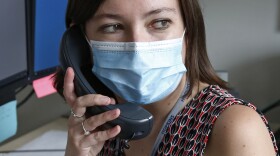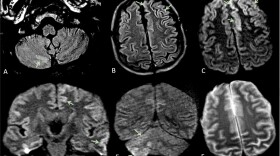-
An analysis of claims data shows stark racial disparities among Medicare beneficiaries diagnosed with COVID-19.
-
Many kids infected with COVID-19 don’t show any symptoms, but for some, the infection is linked to serious illness. Children's hospitals in Ohio have formed a new working group to allow them to better diagnose and treat this disease, called Multisystem Inflammatory Syndrome in Children, or MIS-C. Kids with MIS-C will have high fevers, gastrointestinal issues, and rashes. Internally, the kids will have clotting disorders, dehydration, and cardiac issues.
-
The FDA has revoked permission for hydroxychloroquine to be used as a treatment for COVID-19, after the drug was publicly touted by President Donald…
-
NPR surveyed all 50 states to find out how many people they have doing contact tracing — one of the essential tools for keeping outbreaks from flaring up. Look up your state to see how it's doing.
-
If your allergies are worse this season, you might blame it on the coronavirus pandemic. University Hospitals allergist Dr. Sam Friedlander said it’s possible that allergies are worse now because people stayed home all spring to avoid the virus. Friedlander said when people have new exposures to allergies, they have a dramatic increase in symptoms. That means less time outside during the spring while people stayed home could have an impact.
-
More than 50 people were signed up to speak out at the first hearing in the Ohio Senate for a resolution declaring racism a public health crisis . They...
-
Columbus City Council last week passed a resolution declaring racism a public health crisis. Cuyahoga County and Summit County leaders have considered…
-
Researchers say police should not be using tear gas or pepper spray against protesters. They make people cough droplets and damage the body in ways that could make people sicker from COVID-19.
-
A study of more than 800 health workers, first responders and others finds that taking hydroxychloroquine to prevent COVID-19 is no better than a placebo in preventing the illness.
-
Pictures of the brain in COVID-19 patients are yielding clues that may help identify the virus sooner.
© 2025 WOSU Public Media
Play Live Radio
Next Up:
0:00
0:00
Available On Air Stations









